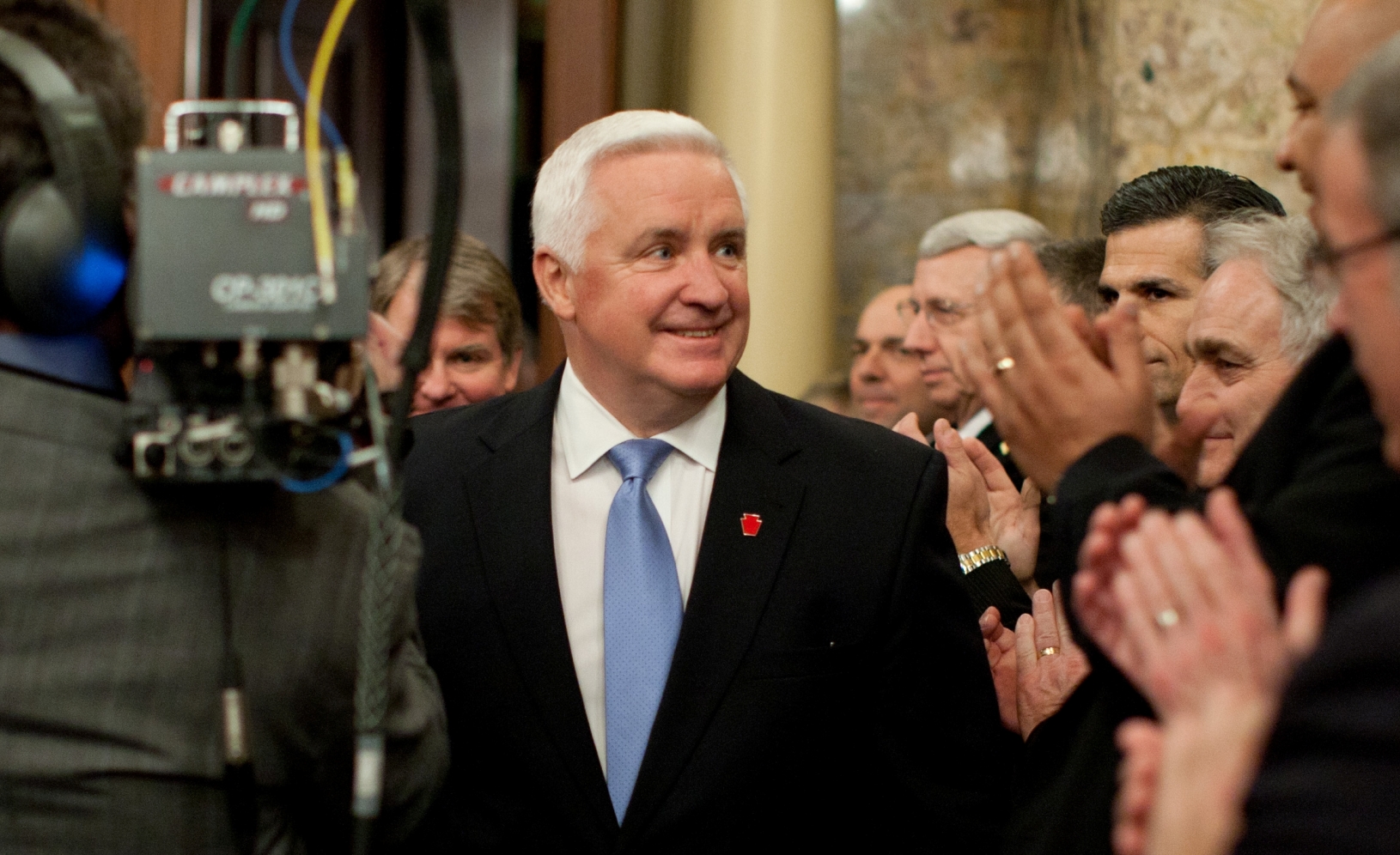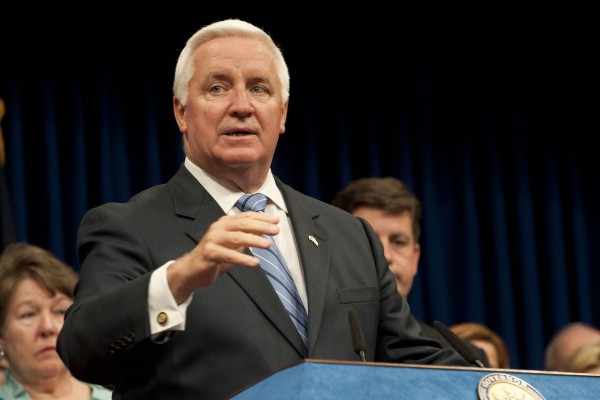Posts
Governor Tom Corbett Answers More Listener Email
/in Ask the Governor, Media, News, Video /by PAMattersState Lawmakers to Return Monday
/in News /by Brad ChristmanThe 2013 summer break hasn’t been what state lawmakers usually hope for when they head back to their districts. State House members have already returned to the Capitol once, and now they’ll be back for another summer encore on Monday.
The issue bringing lawmakers back to the hill deals with the state Fiscal Code. The state budget was passed and signed on June 30th, but lawmakers left the Fiscal Code unfinished, and since that is the mechanism that gives the state authorization to spend the money in the General Fund budget, it must be passed in order for government operations to continue to run.
Democrats say this delayed action on the Fiscal Code means Governor Tom Corbett and Republican leadership can no longer claim to have passed and signed three consecutive “on-time” budgets, but that argument is largely semantic. The Fiscal Code was held up over last-minute changes involving payday lending statutes and posturing by the House and Senate, which have been at odds over several high-profile issues this year despite both being under the Republican flag.
Radio PA Roundtable – July 5, 2013
/in Audio, Media, News, Radio PA Roundtable /by PAMattersOn this week’s Radio PA Roundtable, all the ramifications from last weekend’s legislative activity on the state budget and the other major issues Governor Tom Corbett put on lawmakers’ plates this year (HINT: they didn’t eat their vegetables). Also, the governor and the head of a major union are pointing fingers at each other. Who’s right? Who’s wrong?
Radio PA Roundtable is a 30-minute program featuring in-depth reporting, commentary and analysis on the top news stories of the week.
Click the audio player below to hear the full broadcast:
Ask the Governor – June 10, 2013 (complete 1-hour audio program)
/in Ask the Governor, Audio, Media, News /by Brad ChristmanStarting this month, we will be placing audio from the complete “Ask the Governor” programs on PAMatters.com. Now, you can listen to the entire program and/or watch video clips of specific topics. Click the play button to get started…
[audio:AsktheGov06-10-13_1.mp3]
This program was recorded Monday, June 10th, 2013 and includes discussions on the following topics and more:
-The Philadelphia building collapse investigation
-The budget talks
-Liquor privatization efforts
-Pension reform
-Transportation funding
-The return of Pennsylvania’s original copy of the Bill of Rights
-And listener & web viewer emails
Our next program is scheduled for July 3rd. Submit your question or comment today by clicking on the Ask the Governor link at the top of this page. Be sure to include at least your first name and the town where you live, and please be brief.
Radio PA Roundtable – May 31, 2013
/in Audio, Media, News, Radio PA Roundtable /by PAMattersOn this week’s Radio PA Roundtable, Brad Christman brings you a U.S. Senate vote on a farm bill amendment on crop insurance subsidies backed by Pennsylvania’s Pat Toomey. Also, state House Republicans have their own budget plan in Harrisburg and is there a volunteer firefighting crisis in PA?
Radio PA Roundtable is a 30-minute program featuring in-depth reporting on the top news stories of the week.
Click the audio player below to hear the full broadcast:
[audio:https://s3.amazonaws.com/witfaudio/radiopa/Roundtable05-31-13.mp3]Governor Tom Corbett on the Fall Legislative Session
/in Ask the Governor, Media, News, Video /by PAMattersPennsylvania Casinos Wrap Up Profitable Year
/in News /by PAMattersIt was a good year for table games at Pennsylvania’s casinos, with a double digit increase boosted by June’s numbers and the newest casino.
The Pennsylvania Gaming Control Board says revenue from table games play rose 15.5% last month compared to June of last year, with play up at all but three casinos and helped by the addition of the Valley Forge Casino Resort.
For the fiscal year that ended in June, table games revenue rose nearly 31% over the previous year. All 10 casinos that were operating last year posted increases, with the Sands Casino Resort in Bethlehem showing the highest numbers.
Combined with slot machine revenue generated in the fiscal year, gaming revenue was up 10 percent compared to the previous year.
Tuition Increase for State System Schools Kept Around Inflation Rate
/in News /by PAMattersAfter the state budget kept funding level for the 14 state owned universities, the board of governors is keeping the tuition increase around the rate of inflation for the upcoming academic year.
Tuition will rise by 3%, marking the 5th time in the last 8 years the State System of Higher Education has held the increase at or below the rate of inflation. It means students will pay $188 more a year to attend classes at the schools.
Spokesman Kenn Marshall says the board and universities have worked hard to keep costs under control. He says they’ve made about 230 million dollars in cost savings over the last several years through a number of cost savings initiatives. Last year, tuition rose by 7.5% on the heels of an 18% reduction in state funding.
There will also be an increase in the technology fee; 10 dollars for resident students and 16 for out of state students. Other fees, such as room and board and meal plans, are set on a campus by campus basis.
Out of state students will also pay 3% more for tuition, but those rates vary from campus to campus and program to program.
Marshall says the Governor’s original budget proposal called for another 20% reduction in state funding. He says the system worked with the Governor and legislature over the last few months to get funding restored back to last year’s levels. He says without that, they would not have been able to hold tuition as low as they did.
Governor Touts Human Service Block Grants But Faces Opposition
/in News /by PAMattersSurrounded by a bipartisan group of county commissioners this week, Governor Tom Corbett called on lawmakers to pass his proposed Human Service Block Grant to replace current state funding in seven human service areas.
State Senate Republicans released details Tuesday of a proposed 27.7 billion dollar budget for the next fiscal year, and it did not include the block grant approach yet. A spokesman says it’s still under discussion.
Governor Corbett says the current approach to funding human services provides no flexibility and enforces rigid rules that make it hard for people to receive individualized services. He says the block grant approach will allow counties to prioritize the needs at the local level and cut the red tape.
The County Commissioners Association of Pennsylvania backs the block grant approach. President Jo Ellen Litz, a Lebanon County Commissioner, says it will give counties the flexibility they need to provide people with the services they need.
The group’s Vice President, Christian Leinbach of Berks County, says counties can better decide how the money should be spent and there are safeguards. He says local plans must be published, voted on by the commissioners in public and approved by the Department of Public Welfare. He believes it provides more transparency and accountability than the current system.
But Representative Gene DiGirolomo, a Bucks County Republican, is against combining state money for seven human service areas into one funding stream. He calls it a monumental shift and says the administration is moving too fast. He called for a pilot project to test the concept.
Human service providers say there are already waiting lists for many services and giving counties greater flexibility could leave them fighting each other for limited dollars. Even with the block grants, human service programs face a 10% reduction in funding.
Welcome to PAMatters.com, a new source for news and commentary from Pennsylvania’s capital. In addition to video, audio and pictures from the stories and events that affect YOU, you’ll also get some behind-the-scenes analysis via blogs from our award-winning staff of journalists.








